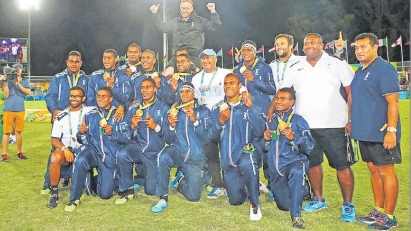Germany’s media landscape, stands as a testament to a fundamental principle: public broadcasters exist to inform, educate and enlighten. Organised under a dual system, giants like ARD, ZDF, and Deutsche Welle operate with a “legal mandate” to serve the public good, providing diverse content, fostering critical discourse, and broadcasting perspectives in a staggering 30 languages. This model, rooted in post-war ideals, views media not merely as entertainment, but as a vital pillar of democracy and societal development. Tragically, Fiji’s recent past offers a stark, inverted reflection of this principle — a time when our own airwaves were not a beacon of enlightenment, but a calculated instrument of control, weaponised to numb minds and obscure decay beneath the roar of a cheering crowd.
UNDER the previous regime, Fiji’s radio and television shed any pretense of a public service mandate akin to Germany’s. Instead, they were systematically conscripted. Educational content, the very lifeblood of a nation’s future, was sidelined or diluted. Critical thinking — the engine of progress and accountability — was actively discouraged. The airwaves were flooded with simplistic narratives, reinforcing passivity and a superficial engagement with national affairs. This wasn’t benign neglect; it was a deliberate strategy of intellectual disarmament. Why foster questioning citizens when docile ones are easier to manage?
The perfect opiate for this engineered apathy was found on the rugby pitch. This era coincided with the phenomenal, world-dominating success of the Fiji 7s team under coaches Ben Ryan and Gareth Baber. These victories were genuine moments of national pride, unifying and exhilarating. However, the regime didn’t just celebrate these triumphs; it weaponised them. Sports coverage, particularly rugby, became the overwhelming, dominant narrative on state-controlled media. Every dazzling try, every tournament win, was amplified into a deafening crescendo, purposefully designed to drown out other, far less palatable, realities.
While the nation was mesmerised by the brilliance of our athletes on the world stage, the regime’s media machine ensured crucial national crises faded into the background static:
1. The rotting core of education:
Our education system, the foundation of national development, was crumbling. Standards plummeted, infrastructure decayed, and critical skills were neglected. Yet, the constant rugby euphoria provided a convenient smokescreen, shifting focus from this existential threat to our future.
2. Infrastructure in freefall and failing health systems:
Beyond schools, the physical and social backbone of the nation collapsed. Roads, utilities, and public services deteriorated alarmingly. Most critically, the health infrastructure entered a state of dangerous decay. Hospitals and clinics grappled with shortages of essential medicines, aging and broken equipment, understaffing, and deteriorating facilities. While ordinary Fijians “ran the gauntlet” of this failing system — facing long waits, substandard care, and preventable suffering — a stark hypocrisy was laid bare: regime ministers and elites paid by our public purse, routinely jetted overseas for their own medical treatment. This glaring disparity exposed not just the system’s failure, but the regime’s contempt for the very people it purported to serve, all while the media remained fixated on the next rugby fixture.
3. Economic stagnation & short-termism:
Amidst this backdrop of decay, the media-fueled obsession with sporting glory, fostered a dangerous culture of immediate gratification. Working class Fijians were encouraged to live for the moment — exemplified by dipping into their hard-earned FNPF savings. These weren’t investments in futures, but “short term, orgasmic trips” to events like the Hong Kong 7s. The regime’s media narrative glorified this immediate thrill, obscuring the long-term financial peril it posed to individuals and the national savings pool, while ministers enjoyed overseas healthcare, funded by the same strained public purse.
This was the insidious genius of the weaponisation: Distraction by celebration. By constantly feeding the populace a diet of sporting triumph and simplistic entertainment, the regime created a nation mesmerised by the glittering surface, blind to the deep cracks spreading beneath. The victories were real, the pride was genuine, but they were exploited to induce a collective amnesia about systemic failures. The media didn’t just report the wins; it actively curated a national mood of complacent celebration, discouraging scrutiny and critical inquiry. “Dumbing down” wasn’t a side effect; it was the core objective. A populace focused on the next try, the next tournament, the next overseas trip funded by dwindling retirement savings, is a populace less likely to question failing schools, collapsing roads, a health system where ministers flee while citizens suffer, or misguided economic policies.
Germany’s public broadcasters strive to supply “information, education, advice and entertainment” as pillars of an informed society. Fiji’s state media, under that regime, inverted this. It supplied relentless sports-fueled entertainment instead of substantive information, instead of genuine education, instead of critical advice. It fostered nationalistic fervor around rugby while allowing the nation’s intellectual, physical, and social health, to erode. The roar of the crowd celebrating a try became the siren song luring Fiji away from confronting the hard truths — including the life-or-death crisis in our hospitals — and building the resilient, thoughtful society it desperately needed. The cost of those celebrated victories, amplified by a complicit media, was a nation sleepwalking through its own decline, its people cheering while the foundations crumbled and its leaders sought solace (and healthcare) far from the problems they created. The final whistle on that era has blown, but the reconstruction of a truly public-serving media, one that learns from both Germany’s model and Fiji’s painful lesson, remains a critical try, yet to be scored.
n RO NAULU MATAITINI is a member of the Great Council of Chiefs. He is a chief of Rewa Province; whose paramount chief is the Marama Bale Na Roko Tui Dreketi, Ro Teimumu Kepa. The views expressed herein are his and not of this newspaper.



